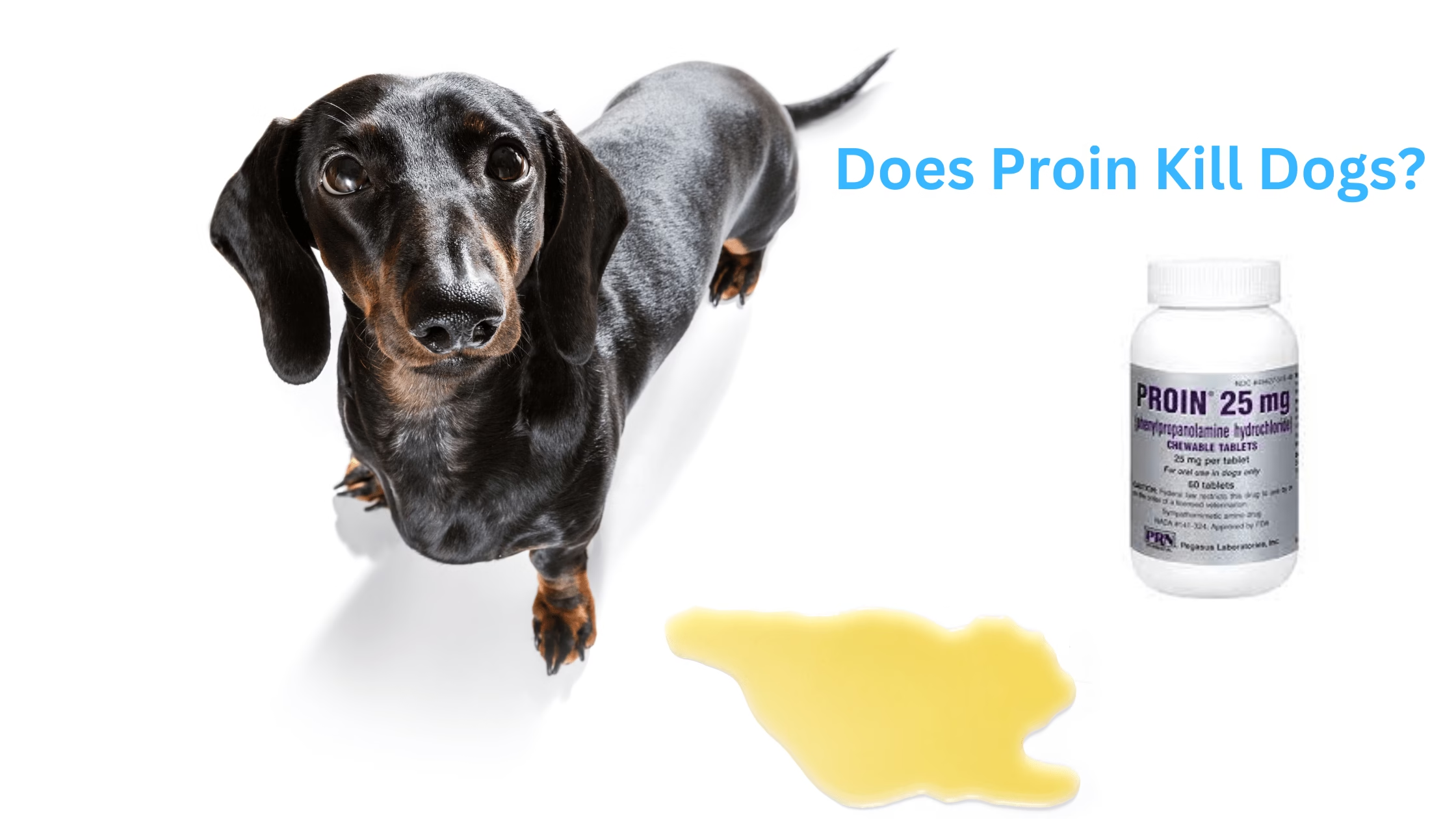Does Proin Kill Dogs? NO, Proin does not typically kill dogs when used as directed by a veterinarian. However, Proin can have potential side effects like any medication and should only be given to dogs under veterinary supervision.
Proin, also known as phenylpropanolamine, is a medication commonly prescribed to treat urinary incontinence in dogs. While it can effectively manage this condition, concerns about its safety and potential side effects have led pet owners to question whether Proin can kill dogs. In this article, we will examine the facts surrounding Proin use in dogs and discuss the risks and benefits of this medication.
What is Proin, and how does it work?
Urinary incontinence is a condition in which dogs leak urine involuntarily. This can be caused by various factors, such as a weakened bladder or a urinary tract infection. Proin is a medication commonly used to treat urinary incontinence in dogs.
Proin works by tightening the muscles in the urethra, the tube that carries urine from the bladder to the outside of the body. By tightening these muscles, Proin helps to prevent urine from leaking out.
Proin contains an active ingredient called phenylpropanolamine, a type of medication known as a sympathomimetic. This means that it works by mimicking the sympathetic nervous system’s actions, which regulate bodily functions such as heart rate and blood pressure. By mimicking these actions, Proin can help to reduce the symptoms of urinary incontinence in dogs.
Also Read : Is a Maltese Husky Mix the Best Dog Breed for You? Find Out Here
Why is Proin prescribed for dogs?
Proin is prescribed for dogs with urinary incontinence, a condition in which dogs cannot control their bladder and leak urine involuntarily. Urinary incontinence can be caused by various factors, such as a weakened bladder or a urinary tract infection.
Proin is an effective treatment for urinary incontinence in dogs because it works by tightening the muscles in the urethra, which is the tube that carries urine from the bladder to the outside of the body. By tightening these muscles, Proin helps to prevent urine from leaking out.
Proin is often prescribed for female dogs that have been spayed, as spaying can increase the risk of urinary incontinence. Male dogs can also develop urinary incontinence, although it is less common in males than females. Proin can also treat other conditions, such as certain types of skin allergies and behavioral disorders, although these are less common.
Side effects of Proin in dogs?
While Proin is an effective treatment for urinary incontinence in dogs, it can cause side effects in some cases. Some of the most common side effects of Proin include restlessness, agitation, and increased heart rate. These side effects are mild and temporary and often disappear as the dog’s body adjusts to the medication.
In some cases, Proin can cause more severe side effects. These can include seizures, high blood pressure, and difficulty breathing. These side effects are rare but can be severe and require immediate veterinary attention.
Proin can also interact with other medications, so it is important to tell your veterinarian about any other medications or supplements your dog takes before starting Proin. This will help to reduce the risk of potential interactions and side effects.
If you notice any signs of side effects in your dog while taking Proin, such as vomiting, diarrhea, or lethargy, you should immediately contact your veterinarian. They may recommend adjusting the dose of Proin or switching to a different medication to manage your dog’s urinary incontinence.
Does Proin kill dogs?
There is no evidence to suggest that Proin directly causes death in dogs. However, like any medication, Proin can cause side effects, some of which can be serious and potentially life-threatening if left untreated.
In rare cases, Proin can cause a sudden and severe increase in blood pressure, leading to organ damage or failure. This is most likely to occur in dogs with underlying heart or kidney disease or in dogs taking other medications that can interact with Proin.
While these side effects are rare, they can be severe and require immediate veterinary attention. It is crucial to monitor your dog closely while taking Proin and to contact your veterinarian if you notice any side effects, such as vomiting, diarrhea, or lethargy.
It is also essential to follow your veterinarian’s instructions for administering Proin and to only give your dog the prescribed dose. Overdosing on Proin can increase the risk of side effects and may be life-threatening in severe cases. By following your veterinarian’s instructions and monitoring your dog closely, you can help to reduce the risk of potential side effects and ensure that your dog is safe and healthy while taking Proin.
How to monitor your dog’s response to Proin?

If your dog has been prescribed Proin, it is essential to monitor their response to the medication to ensure that it works effectively and that they are not experiencing any side effects.
One of the most important things to monitor is your dog’s urinary habits. Please track how often your dog urinates and whether it can control its bladder. If your dog’s urinary incontinence has improved since starting Proin, this is a good indication that the medication works effectively.
It is also essential to monitor your dog for any signs of side effects, such as restlessness, agitation, increased heart rate, or decreased appetite. If you notice any of these signs, contact your veterinarian right away. They may recommend adjusting the dose of Proin or switching to a different medication to manage your dog’s urinary incontinence.
In addition to monitoring your dog’s urinary habits and behavior, following up with your veterinarian regularly is essential to ensure that Proin is still the most appropriate treatment for your dog. Your veterinarian may recommend blood tests or other diagnostic tests to monitor your dog’s health and ensure that Proin is not causing any adverse effects on its organs or other bodily functions.
By monitoring your dog’s response to Proin and working closely with your veterinarian, you can help to ensure that your dog is safe and healthy while managing their urinary incontinence.
Also Read : Rottweilers with cropped ears Deciding What’s Best for Your Dog
Alternatives to Proin for treating urinary incontinence in dogs.
There are several alternative treatment options available for managing urinary incontinence in dogs, aside from Proin. These alternatives include changes to the dog’s diet and exercise routine and other medications that work in different ways to treat incontinence.
One approach to managing urinary incontinence is to modify the dog’s diet to include more fiber or moisture, which can help to improve bowel and bladder function. Increasing the dog’s exercise routine can also help improve muscle tone and control, reducing the frequency and severity of urinary accidents.
Another alternative to Proin is hormone replacement therapy, which may be appropriate for dogs with urinary incontinence caused by a hormonal imbalance. Hormone replacement therapy can help restore the body’s balance of hormones and improve bladder control.
If your dog’s urinary incontinence is caused by an underlying medical condition, such as a urinary tract infection or bladder stones, treating the underlying condition may be enough to improve bladder control. This may involve antibiotics or surgery to remove the bladder stones.
Other medications that may be used to treat urinary incontinence in dogs include estrogen supplements, which can help to improve muscle tone in the urethra and bladder, and imipramine, which can help to reduce bladder contractions and improve bladder capacity.
In some cases, surgery may be recommended to correct an underlying structural problem contributing to the incontinence.
Suppose you are concerned about your dog’s urinary incontinence. The best course of treatment for urinary incontinence in dogs will depend on the underlying cause of the condition and the individual health status of the dog. In that case, it is essential to consult with your veterinarian to determine the most appropriate and effective treatment options for your dog’s individual needs.
Tips for administering Proin safely.
Administering Proin safely is essential to ensure that your dog receives the correct dose and to reduce the risk of potential side effects. Here are some tips for administering Proin safely:
- Always follow your veterinarian’s instructions for administering Proin. This may involve giving the medication with food or at specific times of the day.
- Use a pill cutter or ask your veterinarian to prescribe the appropriate dose for your dog’s weight. Do not attempt to cut or crush Proin tablets on your own, as this may affect the potency and effectiveness of the medication.
- Store Proin in a safe place that is out of reach of children and pets. Keep the medication in its original packaging and store it in a cool, dry place away from direct sunlight.
- Monitor your dog closely for any signs of side effects, such as vomiting, diarrhea, or restlessness. Contact your veterinarian if you notice any signs of side effects, as they may need to adjust the dose or switch to a different medication.
- Do not give Proin to pregnant or nursing dogs, as the medication may harm developing fetuses or nursing puppies.
- If you miss a dose of Proin, do not double the next dose. Instead, give the missed dose as soon as you remember or wait until the next dose.
- Do not give Proin to dogs that are allergic to it or similar medications. If your dog has a history of allergic reactions, talk to your veterinarian before starting Proin.
By following these tips for administering Proin safely, you can help to ensure that your dog receives the correct dose and that they are safe and healthy while taking the medication. Talk to your veterinarian if you have questions or concerns about administering Proin.
Precautions and warnings for Proin use.
Proin is a medication commonly used to treat urinary incontinence in dogs. While it is generally safe and effective when used as directed, there are several precautions and warnings that dog owners should be aware of before giving Proin to their pets.
- Do not give Proin to pregnant or nursing dogs, as the medication may harm developing fetuses or nursing puppies.
- Proin should be used with caution in dogs with a history of heart disease, high blood pressure, or other medical conditions affecting the cardiovascular system.
- Proin can cause side effects, including restlessness, agitation, and increased heart rate. If your dog experiences any of these symptoms, contact your veterinarian immediately.
- Do not use Proin with other medications that affect the cardiovascular system, such as beta-blockers or calcium channel blockers, without consulting with your veterinarian.
- Proin may interact with other medications, including antidepressants and antihistamines. Be sure to tell your veterinarian about all your dog’s medications.
- Proin should be used with caution in dogs with a history of seizures, as the medication may increase the risk of seizures in some cases.
- Do not give Proin to dogs that are allergic to it or similar medications. If your dog has a history of allergic reactions, talk to your veterinarian before starting Proin.
- Proin should be used with caution in older dogs or those with kidney or liver disease, as the medication may affect the function of these organs.
Following these precautions and warnings can help ensure your dog is safe and healthy while taking Proin. Talk to your veterinarian if you have questions or concerns about Proin or its use in your dog.
When to seek veterinary care if your dog experiences adverse reactions to Proin.
Proin is a medication commonly used to treat urinary incontinence in dogs. While it is generally safe and effective when used as directed, some dogs may experience adverse reactions to the medication. If your dog experiences any of the following symptoms, it is essential to seek veterinary care right away:
- Restlessness or agitation
- Loss of appetite
- Vomiting or diarrhea
- Difficulty breathing
- Weakness or lethargy
- Seizures or convulsions
- Rapid or irregular heart rate
If you notice any of these symptoms in your dog, contact your veterinarian immediately. They may need to adjust the dose or switch to a different medication to treat your dog’s urinary incontinence. It is important not to stop or adjust the medication alone, as this can lead to additional health problems.
If your dog experiences a severe allergic reaction to Proin, such as swelling of the face, lips, or tongue swelling, difficulty breathing, or collapse, seek emergency veterinary care immediately. These symptoms can be life-threatening if left untreated.
By seeking veterinary care promptly if your dog experiences adverse reactions to Proin, you can help to ensure that they receive the appropriate treatment and care to minimize the risk of complications.
What is the best medication for urinary incontinence in dogs?

The best medication for urinary incontinence in dogs depends on several factors, including the underlying cause of the incontinence, the age and overall health of the dog, and any other medications or health conditions the dog may have.
The most commonly prescribed medications for urinary incontinence in dogs are Proin (phenylpropanolamine) and estrogen supplements, such as diethylstilbestrol (DES) or estriol. These medications work by tightening the urethral sphincter, which helps to prevent urine from leaking out.
Other medications may be prescribed, such as alpha-adrenergic agonists like pseudoephedrine or duloxetine or anticholinergics like oxybutynin or tolterodine. These medications work by relaxing the bladder muscle, which can help to improve bladder control.
It is important to note that not all medications are appropriate for all dogs, and some dogs may experience side effects or adverse reactions to certain medications. Your veterinarian will thoroughly evaluate your dog’s health and medical history to determine the best treatment for your dog’s urinary incontinence.
In addition to medication, lifestyle changes, and management strategies can help manage urinary incontinence in dogs, such as frequent potty breaks, a consistent feeding schedule, and the use of absorbent pads or diapers.
Overall, the best medication for urinary incontinence in dogs is safe, effective, and tailored to your dog’s needs and health status. Your veterinarian can help you determine your dog’s most appropriate treatment plan.
Conclusion: Weighing the risks and benefits of Proin use in dogs.
Proin is a medication commonly prescribed to treat urinary incontinence in dogs. While it can be an effective treatment for this condition, weighing the risks and benefits of Proin use in dogs is essential.
The benefits of Proin use include improved bladder control and reduced urinary accidents. However, there are also potential risks associated with Proin use, including side effects such as vomiting, diarrhea, restlessness, and more serious adverse reactions like seizures or heart problems.
To ensure the safe and effective use of Proin in dogs, following your veterinarian’s instructions for dosing and administration is essential. Your veterinarian will also monitor your dog’s response to the medication and adjust as needed to minimize the risk of adverse reactions.
In some cases, alternative medications or management strategies may be a better option for treating urinary incontinence in dogs, depending on the dog’s underlying cause and individual health status.
Ultimately, the decision to use Proin or any other medication for your dog’s urinary incontinence should be made in consultation with your veterinarian, who can help you weigh the risks and benefits and make an informed decision about the best course of treatment for your dog. With careful monitoring and appropriate use, Proin can be a safe and effective option for managing urinary incontinence in dogs.







